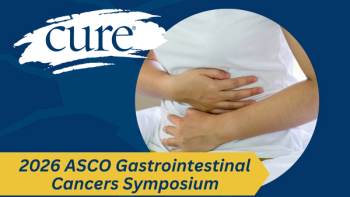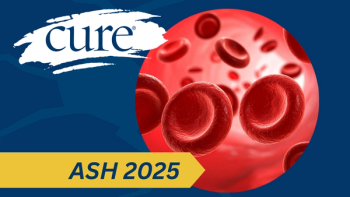
Oya Gilbert, diagnosed with myeloma in 2017, uses advocacy and music to improve awareness, access and support for patients with cancer.

Oya Gilbert, diagnosed with myeloma in 2017, uses advocacy and music to improve awareness, access and support for patients with cancer.

Dr. Elena Elimova discussed data showing 21-month progression-free survival with Ziihera, Tevimbra and chemotherapy for some patients.

Nutritional support helps malnourished patients with advanced gastric cancer maintain chemotherapy and may extend time to treatment failure.

In BREAKWATER, EC plus FOLFIRI achieved a 64.4% response rate and showed a trend toward improved overall survival in patients with BRAF V600E mCRC.

Oya Gilbert blends hip-hop and advocacy to raise awareness about myeloma, engage patients, and address broader health issues in underserved communities.

Study findings show more colorectal cancer risk reduction and safety with the use of a GLP-1RA versus Aspirin.

Physical activity, especially walking, was linked to less fatigue and better quality of life for patients with colorectal cancer, particularly in early survivorship.

Dr. Thejus Jayakrishnan discussed how patients and physicians weigh treatment options in later-line metastatic colorectal cancer.

ECOG performance status was found to capture only part of the patient experience in gastric/GEJ adenocarcinoma.

Dr. Elena Elimova discusses how Ziihera-based therapy may change treatment for HER2+ locally advanced or metastatic gastroesophageal adenocarcinoma.

Dr. William A. Hall discusses overtreatment in gastrointestinal cancer care and how AI-driven response assessment is shaping personalized treatment.

Rusfertide keeps hematocrit under 45% and prevents phlebotomy for most patients with polycythemia vera through 52 weeks of treatment.

Updated VIKTORIA-1 data show gedatolisib plus Faslodex, with or without Ibrance, improves progression-free survival in PIK3CA wild-type advanced breast cancer.

Piqray plus Faslodex improved progression-free survival versus Faslodex alone in CDK4/6 inhibitor–pretreated, PIK3CA-mutated advanced breast cancer.

BOOG 13-08 shows skipping sentinel lymph node biopsy in patients 50+ with early-stage, hormone receptor–positive, HER2-negative breast cancer is safe.

At the 2025 SABCS, researchers presented findings with the potential to meaningfully affect breast cancer treatment and patient care.

DESTINY-Breast05 analyses show post neoadjuvant Enhertu improves invasive disease free survival compared with Kadcyla in patients with residual early stage breast cancer.

Most premenopausal women with early breast cancer accepted GnRHa during chemotherapy to preserve ovarian function; cryopreservation uptake was lower.

Inluriyo and Verzenio helped patients with ER+/HER2– advanced breast cancer stay on treatment longer without their disease worsening vs standard therapy.

Hormone therapy after breast cancer did not increase risk in BRCA1/2 carriers; estrogen alone was linked to lower risk.

For AYA breast cancer survivors, mobile health intervention was associated with improvements to general and cancer-specific quality of life.

Real and sham acupuncture improved perceived cognitive function versus usual care, with real acupuncture showing greater benefits for objective cognitive outcomes.

Emmy-winning journalist and author Suleika Jaouad recently delivered the keynote address at the inaugural Blood Cancer Heroes celebration.

CURE spoke with Dr. Dickran Kazandjian about why MRD matters for patients with multiple myeloma.

The 60-month local regional recurrence-free rate was 93.2% in the MRI arm versus 95.7% in the no MRI arm, researchers reported.

Enhertu and Perjeta led to better quality-of-life and less side effects than standard-of-care among patients with HER2+ advanced or metastatic breast.

Adding radiation before surgery with Keytruda increased immune cells in tumors and led to encouraging responses in people with early-stage breast cancer.

Tecentriq numerically increased the rates of chemotherapy-induced ovarian failure compared with chemotherapy alone for patients with triple-negative breast cancer.

Verzenio showed meaningful improvement for some patients with HR-positive, HER2-negative breast cancer after prior CDK4/6 treatment.

Nuvisertib plus momelotinib is safe and generated improvements in symptom burden, spleen volume, and anemia outcomes in relapsed/refractory myelofibrosis.